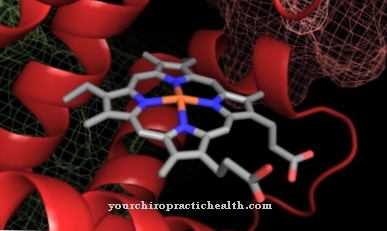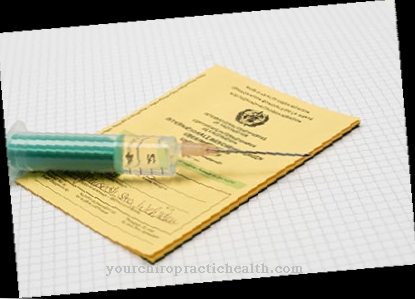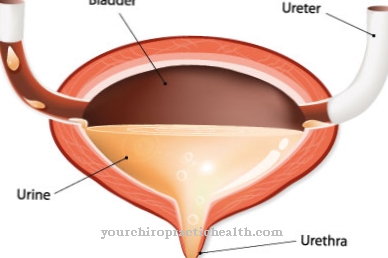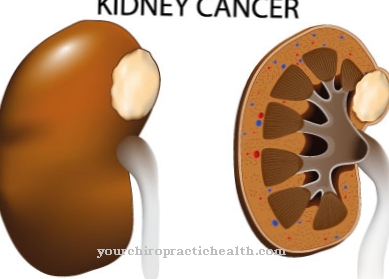The Hypoproteinemia is characterized by a reduced protein concentration in the blood plasma. It is not an independent disease, but often develops as a result of various disorders.
What is hypoproteinemia?

© anaumenko - stock.adobe.com
At a Hypoproteinemia the protein concentrations in the blood plasma are below 6 g / dl. Normally, the protein content in an adult is between 6.1 - 8.1 g / dl.
Hypoalbuminemia is the most common. Here the albumin concentrations are significantly reduced. The immunoglobulins are less frequently reduced. A lack of albumin leads to edema and increased levels of fatty acids, bilirubin and hormones in the blood. If there is a lack of immunoglobulin, the immune system is weakened.
As a symptom of specific underlying diseases or functional disorders, hypoproteinemia cannot be defined as an independent disease.
causes
There are basically four cause complexes for one Hypoproteinemia. It can develop on the basis of malabsorption, malnutrition, high protein losses or disorders of protein synthesis. There are various diseases that are characterized by decreased protein absorption in the intestine (malabsorption).
These include food allergies, food intolerances such as celiac disease or sprue, chronic bowel disease and cystic fibrosis. Malnutrition occurs with hunger, anorexia nervosa (anorexia) or with tumors in the gastrointestinal tract. There are also diseases that lead to severe protein losses.
Especially kidney diseases such as B. the nephrotic syndrome are characterized by high protein losses. Even with extensive burns and dermatoses, the body loses a lot of protein. Disturbances in protein synthesis occur in liver cirrhosis and in antibody deficiency syndrome and then lead to hypoproteinemia.
Symptoms, ailments & signs
A number of symptoms can manifest itself in hypoproteinemia. Edema typically develops as the disease progresses. This accumulation of water can occur all over the body and is sometimes associated with severe pain, an increased risk of infection and other complaints. Often skin irritations such as itching and pain are added.
Hypoproteinemia can also lead to ascites, which in turn is linked to a number of symptoms and ailments. For example, gastrointestinal complaints such as flatulence, diarrhea, nausea and vomiting often occur. In the long term, weight loss can occur. Hypoproteinemia is usually associated with low blood pressure, combined with dizziness and other disturbances of consciousness.
In the course of the disease, there are more infections and inflammations. Depending on the severity of the disease, the weakened immune system can cause other health problems. Furthermore, hypoproteinemia can cause damage and discomfort to the internal organs. If left untreated, the disease can be fatal.
There is also an increased risk of long-term damage to the immune system. In the worst case, untreated hypoproteinemia is fatal for the patient. Before that, the symptoms intensify and eventually lead to unconsciousness and a coma.
Diagnosis & course
The Hypoproteinemia is partly the result of life-threatening illnesses and sometimes leads to situations that can be very dramatic.
Dangerous infections can occur due to a lack of immunoglobulin as the immune system is weakened. However, there is usually a shortage of albumins. This always leads to edema (water accumulation in the tissue). In more severe cases, ascites or pleural effusion can occur. Ascites is the accumulation of water in the abdomen between the organs. The hunger stomach is typical. Water can also collect in the lungs (pleural effusion). In ascites in particular, bacteria sometimes move from the intestine into the abdomen.
In conjunction with the weakened immune system, these infections can be fatal. The accumulations of water arise as a result of the reduction in colloid osmotic pressure, also known as oncotic pressure, in the blood vessels. Water seeps through the blood vessels to the outside. With normal concentrations of colloidal protein particles, the oncotic pressure would be sufficient to prevent this fluid loss. In addition to edema, the patient also suffers from low blood pressure.
At the same time, the concentration of fatty acids, bilirubin and hormones in the blood increases, since the absorption capacity of the albumins for these substances is too low due to their deficiency. These symptoms lead to the suspected diagnosis of hypoproteinemia. Serum protein electrophoresis can be used to determine whether albumins or immunoglobulins are present in a reduced concentration. However, since hypoproteinemia usually does not occur in isolation, its causes should be determined in order to be able to treat the underlying disorder effectively.
Complications
In most cases, hypoproteinemia does not occur on its own and is always the result of an underlying disease. For this reason, the symptoms and complications of the causative disease must always be considered in the foreground. However, the hypoproteinemia leads to low blood pressure and ascites.
Due to the low blood pressure, many patients suffer from dizziness and nausea and in the worst case can completely lose consciousness. In general, those affected feel weak and the patient's resilience decreases enormously. The immune system is also usually weakened and the person affected becomes ill more often and suffers more from infections and inflammations. The quality of life decreases relatively sharply due to the hypoproteinemia.
Furthermore, the disease can cause various damage and discomfort to the internal organs of the body. As a rule, there is no symptomatic treatment for hypoproteinemia. The treatment is always causal and depends on the underlying disease. In most cases, the disease progresses positively without complications. If necessary, the patient has to change his diet in order to counteract the symptoms.
When should you go to the doctor?
If low blood pressure, edema, or signs of ascites are noticed, a doctor should be seen promptly. If you suddenly become very dizzy, possibly associated with nausea and vomiting, you should see a doctor immediately. If the person affected becomes unconscious, the first aiders must call the emergency doctor and provide first aid. Serious infections or disorders of organ function must be treated in hospital.
In any case, hypoproteinemia requires medical clarification, because if left untreated, the disease can lead to serious complications and, in the worst case, be fatal. People who suffer from chronic intestinal diseases, food allergies, cystic fibrosis and other diseases that can cause malnutrition should consult their family doctor if they have mentioned symptoms and complaints. The doctor can clarify the cause and, if necessary, refer the patient to an internist. If psychological or psychosomatic complaints develop in the course of the illness, a therapist must be called in. With children, if hypoproteinemia is suspected, the pediatrician should be consulted.
Doctors & therapists in your area
Treatment & Therapy
The therapy one Hypoproteinemia is only possible in connection with the treatment of the underlying disease. Once the cause of the hypoproteinemia has disappeared, the protein concentrations in the blood quickly return to normal.
The leakage of water from the blood vessels is stopped and the edema regresses. In severe cases, the ascites must be punctured through the abdominal wall and drained. The patient is also given diuretics to remove the excess water from the body. However, it is important to treat the respective underlying disease. Malnutrition in anorexia often requires psychological therapy.
With celiac disease, a gluten-free diet is important. Serious liver and kidney diseases must be treated individually according to the type and severity of the respective disorder. Long-term therapy is often necessary if there is a chronic disease. At the same time, recurring accumulations of water in the abdomen and lungs should be removed by puncture in hypoproteinemia.
You can find your medication here
➔ Medicines to strengthen the defense and immune systemprevention
To prevent a Hypoproteinemia no recommendation can be given, as there are many causes. Recommendations only apply to the respective underlying disease. However, if the disease is known, treating it can prevent hypoproteinemia.
Aftercare
The treatment of hypoproteinemia also includes subsequent therapy or aftercare. These later steps are aimed at determining the origin of the disease. In order to normalize the protein concentration in the blood again, there are some additional measures that patients can help themselves with.
Often there is a need to change the nutrition plan. Daily aftercare consists, for example, of a gluten-free diet with lots of fruit and vegetables. Lean meat provides the necessary vital substances. Mineral water, diluted fruit juice and herbal tea are ideal for fluid intake. If the doctor diagnoses liver and / or kidney disease, there is another approach to improving your health.
A corresponding change in diet is also helpful here. In the case of malnutrition, such as occurs in anorexia, patients should optimize their food intake. This usually requires a new body awareness, which in turn is closely related to the psychological situation.
Psychotherapeutic support is recommended for people who suffer from an eating disorder. A nutrition expert can also help put together an individual diet. In this way, the body gradually and gently receives the necessary nutrients. In some cases, follow-up care also includes the treatment of any edema that may be present. There are natural healing methods such as massages or acupuncture for this.
You can do that yourself
Patients diagnosed with hypoproteinemia may be able to take some measures themselves to aid medical treatment.
If the symptoms are due to celiac disease, the diet must be changed. The menu should be gluten-free and consist of healthy foods such as fruits, vegetables and lean meat. You should also consume plenty of fluids, ideally mineral water, herbal teas or diluted fruit juices. Any liver and kidney diseases must also be treated. What the sick person can do here depends on the type of illness. In general, a balanced diet, supported by a healthy lifestyle with sufficient exercise and stress avoidance, helps here too. If the hypoproteinemia is due to malnutrition, daily food intake must be improved.
Since chronic malnutrition is mostly due to psychological causes such as anorexia or other eating disorders, a visit to a psychologist is recommended. To support this, a suitable diet should be created with a nutritionist, which gently supplies the body with all the necessary nutrients. For self-treatment of any edema, massages and acupuncture are available, always in consultation with the responsible doctor.



.jpg)


.jpg)

















.jpg)



